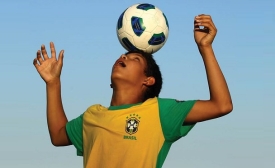brazil
The team that lost this week is trying to beat the other team that lost this week. It's Brazil versus Netherlands -- honestly, I may have that wrong -- and at this point, even Brazilian supermodel Adriana Lima is barely interested. From a geopolitical balance-of-power perspective, does anyone care who comes in third? Is there a war in history where a country took home (at least, what was left of home) the proverbial bronze medal? After President Bush declared Mission Accomplished in the Iraq war, did he announce a run-off between Afghanistan and Iran?
Roger Kittleson, Brazil expert and Professor of History at Williams College, is interviewed by Bryony Inge about his new book; The Country of Football: Soccer and the Making of Modern Brazil. In this podcast he discusses the relationship between soccer and Brazilian identity, and whether the Brazilian government is likely to use sport as a tool to achieve its policy goals.

This week, we learned that enhancing Brazil's national image through soccer has pitfalls and obstacles (thanks, Germany).

Listen to CPD's interview with Roger Kittleson about The Country of Football: Soccer and the Making of Modern Brazil.
For a country that staked its political future on projecting soft power by using the World Cup as a means of promoting national unity, that decision now appears to have been misplaced. Brazil must now assume the risk of letting its citizens decide how best to create a nation that provides opportunities for all with greater public security and less inequality for those who really want to create a zone of peace in South America.
As the Brazil team has come spectacularly undone in the World Cup, the pain for the host country has been compounded by the prospect that its hated rival, Argentina, could still lift the championship trophy on Sunday in Rio de Janeiro’s fabled Estádio do Maracanã, after Argentina won a tense semifinal against the Netherlands in a penalty shootout on Wednesday afternoon. The tens of thousands of Argentine fans who have invaded Brazil to cheer for their team, and taunt their hosts, brought with them a song that predicts not just triumph for Argentina, but deep humiliation for Brazil.
Leaders of the five largest emerging economies will meet July 13-16 to finalize their first joint project: a new international development bank. The countries, known as BRICS (Brazil, Russia,India, China, and South Africa) have spent many years trying to find a common goal. Together they have more than 40 percent of the world’s population. And they share an interest in challenging many of the norms set by the West. Yet each nation is quite different in governance and ambition.
Everyone knew it would be difficult for Brazil without the injured star Neymar and the suspended captain, Thiago Silva, but nobody imagined this feeble capitulation — four goals surrendered to Germany in six minutes during a 7-1 rout in a World Cup semifinal. Early on, Brazil’s players bickered, lost their cool, then lost their fight. The country of the beautiful game was left to face a grotesque humiliation.







